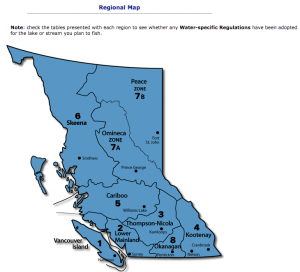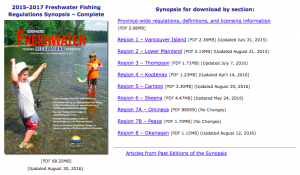2015-2017 – Freshwater Fishing Regulations
2015-2017 – Freshwater Fishing Regulations from
http://www.env.gov.bc.ca/fw/fish/regulations/

This highlights the different fishing regulation regions and is helpful to visualize by looking at this map.

“All sport fishing regulations in effect in freshwater in British Columbia (except for salmon fishing and fishing in National Parks) are published every two years in the Regulations Synopsis booklet. A copy is also posted on this web site. Anglers should become familiar with these regulations before going fishing. Click on the province-wide regulations first. These are in effect throughout B.C.
The 2015-2017 edition of the Freshwater Fishing Regulations Synopsis is effective April 1, 2015 to March 31, 2017. In the event that there is a need to change a regulation in-season, the online version of the synopsis will be updated with any changes highlighted in red. The regional In-Season Regulation Changes will continue to be updated.” (Province of British Columbia, 2016)

